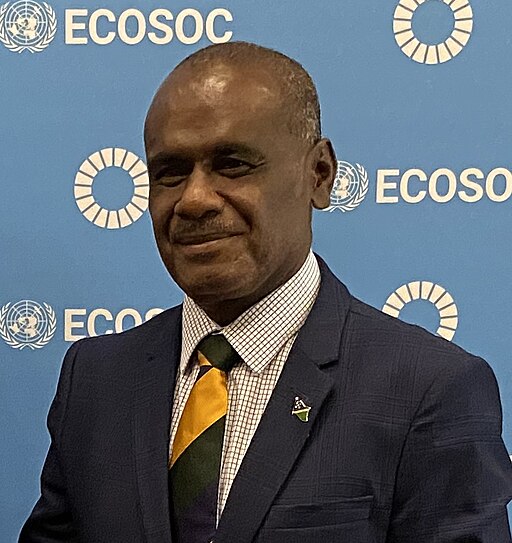Solomon Islands Prime Minister Jeremiah Manele requests Australia’s support to double the size of the royal Solomon Islands police force during talks with Prime Minister Anthony Albanese in Canberra
Solomon Islands Prime Minister Jeremiah Manele embarked on his inaugural visit to Australia since assuming office, engaging in crucial bilateral discussions with Prime Minister Anthony Albanese at Parliament House in Canberra. The focal point of Manele’s visit centered on enhancing Solomon Islands’ security capabilities in the wake of recent unrest within the Pacific Island nation.
During the discussions, Manele articulated a significant request for Australia’s assistance in expanding the Royal Solomon Islands Police Force (RSIPF) from its current strength of 1,500 officers to a robust 3,000 officers over the next decade. This plea follows periods of instability and violence in Solomon Islands, necessitating reinforced law enforcement capacities to restore and maintain order.
Embed from Getty ImagesAustralia, a longstanding regional ally, expressed willingness to consider Manele’s proposal, emphasizing mutual interests in fostering security and stability across the Pacific. Prime Minister Albanese underscored the importance of collaborative efforts in bolstering regional sovereignty, implicitly contrasting with external influences, particularly China’s growing presence in the region.
Manele’s visit also served to address diplomatic tensions stemming from Solomon Islands’ controversial security agreement with China in 2022, which saw the deployment of Chinese police personnel for training purposes. This move had raised eyebrows in Canberra and other Western capitals, prompting Manele to assure Australia of his government’s commitment to balancing international partnerships while prioritizing domestic security needs.
Acknowledging Australia’s concerns regarding external involvement in Pacific security affairs, Manele reaffirmed Solomon Islands’ intent to adopt a new “three-tier” security framework. This strategy emphasizes domestic policing by the RSIPF as the primary response to security challenges, supplemented by support from Melanesian Spearhead Group countries and Pacific Islands Forum nations. However, Manele also stressed the inclusive nature of Solomon Islands’ security policy, indicating a continued role for China in capacity-building initiatives.
Beyond security cooperation, Manele’s discussions with Albanese encompassed broader economic and developmental challenges facing Solomon Islands. Manele highlighted the necessity of fostering a robust private sector and enhancing exports in industries such as forestry, fisheries, tourism, and mining to stimulate economic growth and create sustainable employment opportunities for Solomon Islanders.
Following the Canberra meetings, Manele expressed gratitude for Australia’s historical support in development and security realms while affirming his government’s commitment to addressing Australian concerns constructively. Manele’s diplomatic tour will proceed with visits to China and Japan, aimed at strengthening ties and seeking additional economic assistance for Solomon Islands’ ongoing development initiatives.
Analysis:
Political Perspective: The bilateral talks between Manele and Albanese underscore the intricate political dynamics within the Pacific region. Manele’s request for Australian assistance in police force expansion reflects Solomon Islands’ strategic alignment with traditional allies amid concerns over China’s increasing influence. This move also highlights Australia’s role as a key security partner in the Pacific, reinforcing regional stability through collaborative security initiatives.
Social Perspective: The request to bolster the RSIPF addresses societal concerns within Solomon Islands regarding public safety and governance. The expansion of the police force is viewed as essential in restoring order and ensuring citizen security amidst periodic bouts of unrest. Additionally, Manele’s emphasis on economic development aims to alleviate socio-economic challenges by fostering job creation and enhancing livelihoods, particularly in rural communities dependent on primary industries.
Economic Perspective: Solomon Islands’ economic aspirations hinge on diversifying its economy beyond subsistence agriculture and natural resource extraction. Manele’s focus on enhancing the private sector and increasing exports aligns with broader regional economic strategies aimed at achieving sustainable growth and reducing dependence on external aid. Collaborative efforts with Australia and potential economic engagements with China and Japan could stimulate investment and infrastructure development crucial for long-term economic stability.
Racial Perspective: The involvement of external powers like China and Australia in Solomon Islands’ security affairs raises racial sensitivities, reflecting historical and contemporary power dynamics in the Pacific. Manele’s navigation of these relationships underscores Solomon Islands’ efforts to assert its sovereignty while balancing competing geopolitical interests. The “three-tier” security framework attempts to integrate regional and international partnerships while asserting Solomon Islands’ autonomy in addressing internal security challenges.
Gender Perspective: While gender dynamics were not explicitly discussed in the context of Manele’s visit, Solomon Islands’ broader societal challenges, including gender equality and women’s empowerment, remain pertinent. Efforts to strengthen governance and security frameworks should consider inclusive policies that promote gender equity and protect vulnerable populations, ensuring that developmental gains benefit all segments of Solomon Islands’ society.
